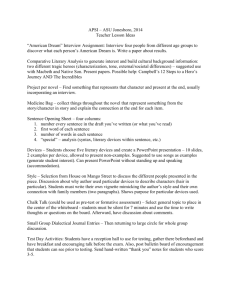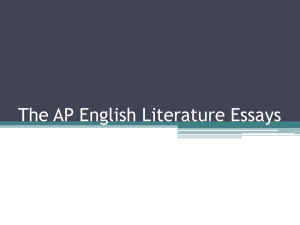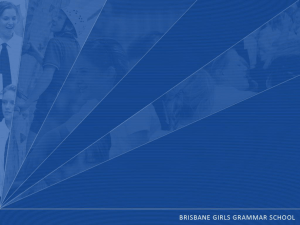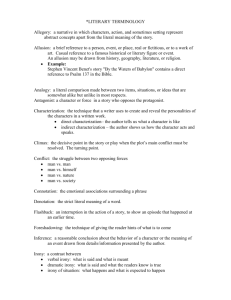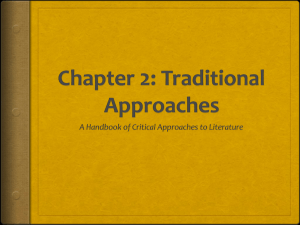Diploma Programme subject outline*Group 1: studies in language
advertisement
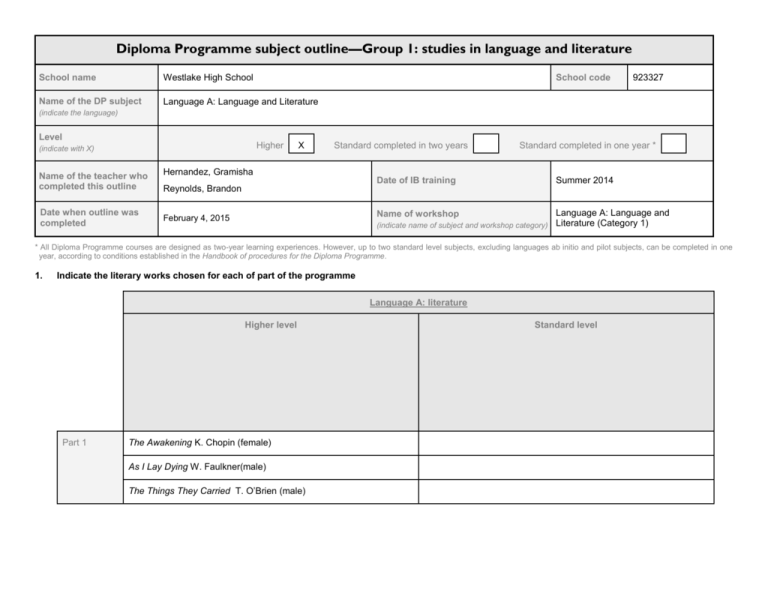
Diploma Programme subject outline—Group 1: studies in language and literature School name Westlake High School School code Name of the DP subject Language A: Language and Literature 923327 (indicate the language) Level Higher (indicate with X) Name of the teacher who completed this outline Date when outline was completed X Standard completed in two years Hernandez, Gramisha Reynolds, Brandon February 4, 2015 Standard completed in one year * Date of IB training Summer 2014 Name of workshop Language A: Language and Literature (Category 1) (indicate name of subject and workshop category) * All Diploma Programme courses are designed as two-year learning experiences. However, up to two standard level subjects, excluding languages ab initio and pilot subjects, can be completed in one year, according to conditions established in the Handbook of procedures for the Diploma Programme. 1. Indicate the literary works chosen for each of part of the programme Language A: literature Higher level Part 1 The Awakening K. Chopin (female) As I Lay Dying W. Faulkner(male) The Things They Carried T. O’Brien (male) Standard level Language A: literature Higher level Part 2 Othello Shakespeare (male) Taming of the Shrew Shakespeare (male) Sonnet Sequence Shakespeare (male) Various Mass Media Texts Part 3 A Doll’s House H. Ibsen (male) Frankenstein M. Shelley (female) Love in the Time of Cholera G. G. Marquez (male) Eat, Pray, Love E. Gilbert (female) Part 4 The Adventures of Huckleberry Finn M. Twain (male) A Raisin in the Sun L. Hansberry (female) The Death of a Salesman A. Miller (male) What Do We Know M. Oliver (female) Standard level 2. Course outline – Use the following table to organize the topics to be taught in the course. If you need to include topics that cover other requirements you have to teach (for example, national syllabus), make sure that you do so in an integrated way, but also differentiate them using italics. Add as many rows as you need. – This document should not be a day-by-day accounting of each unit. It is an outline showing how you will distribute the topics and the time to ensure that students are prepared to comply with the requirements of the subject. – This outline should show how you will develop the teaching of the subject. It should reflect the individual nature of the course in your classroom and should not just be a “copy and paste” from the subject guide. – If you will teach both higher and standard level, make sure that this is clearly identified in your outline. Topic Contents (as identified in the IB subject guide) Allocated time Assessment instruments to be used One class is 90 minutes. In one week there are 3 classes. Resources List the main resources to be used, including information technology if applicable. State the topics in the order you are planning to teach them. Year 1 Part One: Language in Cultural Context (see beneath table for details) The Awakening As I Lay Dying The Things They Carried Part Four: Critical Study The Adventures of Huckleberry Finn A Raisin in the Sun Death of a Salesman What Do We Know Eighteen weeks Unit 1: The Awakening (Weeks 1-6) Unit 2: As I Lay Dying - Written Tasks 1 and 2 20% - Socratic seminar - Presentations (Weeks 7-12) - Further Oral Activity 15% Unit 3: The Things They Carried (Weeks 13-18) - Individual Oral Commentary 15% Eighteen weeks - Practice Writing Prompts Unit 1: The Adventures of Huckleberry Finn (Weeks 1-6) Unit 2: A Raisin in the Sun/The Death of a Salesman (Weeks 7-12) Unit 3: What Do We Know (Weeks 1318) The Awakening As I Lay Dying The Things They Carried How to Read Literature Like a Professor (throughout programme) - In Class Writing Voice Lessons: Classroom Activities to Teach Diction, Detail, Imagery, Syntax, and Tone (throughout programme) - Formal and Informal Analysis Rhetorical Grammar (throughout programme) The Bedford Glossary of Critical and Literary Terms (throughout programme) The Adventures of Huckleberry Finn A Raisin in the Sun The Death of a Salesman What Do We Know Critical Encounters (throughout programme) Topic Contents (as identified in the IB subject guide) Allocated time One class is 90 minutes. In one week there are 3 classes. State the topics in the order you are planning to teach them. Year 2 Part Two: Language and Mass Communication Resources List the main resources to be used, including information technology if applicable. Othello Eighteen weeks Othello The Taming of the Shrew Unit 1: Othello (Weeks 1-6) The Taming of the Shrew I Collected Sonnets of W. Shakespeare Collected Sonnets of W. Shakespeare Part Three: Texts and Context Assessment instruments to be used Unit 2: The Taming of the Shrew (Weeks 7-12) Unit 3: Collected Sonnets of W. Shakespeare (Weeks 13-18) - Formal and Informal Analysis with focus on poetry A Doll’s House Eighteen weeks - Written Task 3 and 4 20% Frankenstein Unit 1: A Doll’s House (Weeks 1-3) - Class Discussion Love in the Time of Cholera Unit 2: Frankenstein (Weeks 3-6) - Individual Student Teacher Discussion Eat, Pray, Love Unit 2: Love in the Time of Cholera (Weeks 7-10) Unit 3: Eat, Pray, Love (Weeks 11-14) - Individual Oral Commentary 15% - Paper One 25% - Paper Two 25% Contents (details) The Awakening Gain an insight into Realism and such concepts as fate, hubris, and (dramatic) irony Learn about the origin and development of women’s liberation Analyze and critically assess the specific role of characters within the novel As I Lay Dying Develop skills in reading and appreciating different narrative forms Analyze and critically assess the specific role of characters within the novel Explore the traditions in different cultures Explore the use of stream of consciousness A Doll’s House Frankenstein Love in the Time of Cholera Eat, Pray, Love - I The Things They Carried Students will read the text closely, paying attention to detail and drawing conclusions about literary devices used by the author Develop skills in reading and appreciating meta-fiction Explore elements of meta-fiction Analyze and critically assess the specific role of characters within the novel Explore the use of allusions, archetypes, syntax Adventures of Huckleberry Finn Students will understand satire incorporated into a narrative form Infer the meanings of unfamiliar words encountered in the novel by using structural and contextual analysis Explore how environment and experiences shape a person's character A Raisin in the Sun and Death of a Salesman Identify the conflicts in both plays Evaluate the cultural implications of the time period and how it can affect the outcome Explore the concept of the “American dream” as it applies to different groups Understand the significance of the resolutions Appreciate conflict in its relationship to character and plot Develop skills in reading and appreciating the dramatic form What Do We Know Perform a close analysis of an assigned poem by Mary Oliver Identify patterns and rhyme scheme Define poetic devices and identify their use in a poem Grasp the meaning of a poem and its themes with the help of poetic devices Othello Students will read the text closely, paying attention to detail and drawing conclusions about literary devices used by the author Relate specific text/quotations to character traits Explore the use of dramatic devices in the play The Taming of the Shrew Demonstrate an understanding of why certain literary works may be considered classics or works of enduring quality and substance Explore the relationship between music, history, and culture Understand various meanings of social group and the ways in which they function Understand how role, status, and social class may affect interactions between individuals and social groups William Shakespeare Perform a close analysis of an assigned poem by Shakespeare Define poetic devices and identify their use in the poem Discuss how poetic devices contribute to the overall meaning of the poem Explore the poem’s themes with the help of poetic devices Identify patterns and rhyme scheme A Doll’s House Identify those qualities and traits associated with the ideal woman over several time periods and several cultures Demonstrate an understanding of why certain literary works may be considered classics or works of enduring quality and substance Explore the dramatic elements within the play Frankenstein Explore shifting narrative points of view within the novel Evaluate the effectiveness of a frame narrative Explore characteristics of the Gothic Novel Discuss symbolism and imagery found in the novel Love in the Time of Cholera Demonstrate detailed critical understanding in analyzing the ways in which structure, form and language shape meaning in the novel Understand the significance of Point of View and Narrative Structure as important aspects of this work Form relevant and informed responses to novel Eat, Pray, Love 3. Explore how historical events are represented fiction Understand narrative perspective as culturally-positioned Demonstrate an understanding of why certain literary works may be considered classics or works of enduring quality and substance IB Internal and external assessment requirements to be completed during the course Explain briefly how and when you will work on them. Include the date when you will first introduce the internal and external assessment requirements, when they will be due and how students will be prepared to complete them. Part One: Written Task 1 (Internal and External) 20-25% ~ Exploring Cultural Aspects of American Novels - Reflective statement 300–400 words in length - Literary essay 1,200–1,500 words in length Further Oral Activity (Internal) 15% - Interactive Orals The previously stated assessments will be introduced by the second week of school. Students will have the option of completing their interactive oral individually or with group members (this may depend upon class sizes). Each interactive oral must be 30 minutes in length, and while the individual/group is completing the interactive oral the rest of the class will be observing. These will occur throughout the duration of Part One. Interactive orals can be completed in various ways including, but not limited to, Socratic seminars and presentations. Students will prepare for interactive orals through classroom instruction and individual study. After each Interactive Oral, every student must write a reflective statement responding to the prompt: How was your understanding of cultural and contextual considerations in the work developed through the presentation? This prompt will be discussed and explained before any presentations are given. Students will also participate in supervised writings. Supervised writings are timed, open-book, in-class writings that last 40-50 minutes in length. The writings will be based upon 3-4 teacher created prompts. Finally, students will be required to complete a literary essay. During student- teacher conferences, guidance will be given in order to aid the development of the literary essay. Formative Assessments - Discussions Quizzes Daily exercises from Voice Lessons: Classroom Activities to Teach Diction, Detail, Imagery, Syntax, and Tone by Nancy Dean Introduction and explanation of different rubrics will begin week 2 of part 1. Part Four: Written Task 2 (Internal and External) 20-25% ~ Exploring Cultural Aspects of American Novels - Critical Response Individual Oral Commentary (Internal) 15% - Interactive Oral Activities The previously stated assessments will be introduced by the second week of school. Students will have the option of completing their interactive oral individually or with group members (this may depend upon class sizes). Each interactive oral must be 30 minutes in length, and while the individual/group is completing the interactive oral the rest of the class will be observing. These will occur throughout the duration of Part Four. Interactive orals can be completed in various ways including, but not limited to, Socratic seminars and presentations. Students will prepare for interactive orals through classroom instruction and individual study. After each Interactive Oral, every student must write a reflective statement responding to the prompt: How was your understanding of cultural and contextual considerations in the work developed through the presentation? This prompt will be discussed and explained before any presentations are given. Students will also participate in supervised writings. Supervised writings are timed, open-book, in-class writings that last 40-50 minutes in length. The writings will be based upon 3-4 teacher created prompts. Finally, students will be required to complete a literary essay. During student- teacher conferences, guidance will be given in order to aid the development of the literary essay. The Individual Oral Commentary will be discussed during week one of part four. Students will be encouraged to use creativity; however, a ‘statement of intent’ will be required. Students will prepare for the Individual Oral Presentation using classroom instruction and hands on practice. Formative Assessments - Discussions Quizzes Part Two: Written Tasks 3 / Paper 1 (Internal and External) 20-25% ~ Shakespeare in the Modern World - Reflective statement 300–400 words in length - Literary essay 1,200–1,500 words in length Further Oral Activity (Internal) 15% - Interactive Orals The Individual Oral Commentary and Discussion and Paper 1 will be discussed by week two of part two. Students will prepare for the Individual Oral Commentary through classroom activities in which they will be called upon to discuss a poem. Students will also create discussion questions based on poems that are being taught during part two in order to foster ways of dissecting and interpreting the poem. Preparation for paper one will begin early in order to ensure students are able to respond to two previously unseen passages and write a literary analysis on the given passages. Preparation will be both formal and informal and will be completed both in class and at home. Formative Assessments - Discussions Quizzes Practice Oral and Written Commentaries in which students will receive passages from the current works we will be studying. Students will have to annotate passages, spend time preparing and then deliver their oral commentary. Snippet Assignment will require students to pick a small bit of text from the work we are currently discussing and present it to the class with an explanation of why it was selected. Students should be prepared to facilitate discussion. Part Three: Written Task 4 / Paper 2 (External) 25% Paper two will be discussed during week one of part three in order to ensure students are prepared to respond to questions without access to texts. Practice sessions will be held before and after school with an emphasis on comparing and contrasting the similarities and differences between two works. Formative Assessments - 4. Discussions Quizzes Students will receive passages from the current works we will be studying. Students will have to annotate passages, spend time preparing and then write a commentary on the use of literary conventions in the passage. Links to TOK You are expected to explore links between the topics of your subject and TOK. As an example of how you would do this, choose one topic from your course outline that would allow your students to make links with TOK. Describe how you would plan the lesson. Topic Link with TOK (including description of lesson plan) Part Four: Critical Study After students have read and gained a strong understanding of the texts that were assigned in part four, they will participate in Socratic seminars. Questions such as: What is reality? How does one define reality? How does one know that their understanding of reality is true? How do the characters in the texts define reality? In essence: How do we know what we know? A discussion of techniques both in literature and in our own human reasoning will be addressed. Emphasis will be put on self-guided student discovery. 5. International mindedness Every IB course should contribute to the development of international mindedness in students. As an example of how you would do this, choose one topic from your outline that would allow your students to analyze it from different cultural perspectives. Briefly explain the reason for your choice and what resources you will use to achieve this goal. Topic Topic One: Language in Cultural Context Contribution to the development of international mindedness (including resources you will use) - I will use The Things They Carried from part 1 as the primary text for discussing international mindedness. We will first look at how war not only impacted America, but North and South Vietnam. We will look at literature from all three areas. We will also look at contemporary pieces about the war’s lasting effects. - I will ask students to follow an international columnist and an American columnist and compare and contrast the workings of the world with the workings of the United States. 6. Development of the IB learner profile Through the course it is also expected that students will develop the attributes of the IB learner profile. As an example of how you would do this, choose one topic from your course outline and explain how the contents and related skills would pursue the development of any attribute(s) of the IB learner profile that you will identify. Topic Contribution to the development of the attribute(s) of the IB learner profile Parts One: Language in Cultural Context Inquirers: There will be assignments given to students that will allow them the ability to follow their own sense of curiosity. Instruction about research tools will be provided to further guide them. Example: Students will explore attributes of single or multiple perspectives in novel. Students will be able to decide what point of view would best serve to write a narrative of their own about a controversial topic. Knowledgeable: Woven throughout the entire course will be a local and global thread in which students will be asked to think, write and articulate critically about their gained understanding of their local and global community. This will be done using outside resources and the texts listed under part one. Example: Students will write a compare and contrast paper in which they will compare society today with the society presented in the chosen work. Communicators: Exploring a variety of modes of communication both individually and in a group setting will be vital in their success. The use of the texts listed under part one will aid in the beginning phase of understanding a variety of modes of communication and will lead to the eventual production of their own modes of communication. Everyone will participate in an interactive oral and students will later communicate those ideas through a supervised writing, followed by a final essay. Open-minded: Through the analysis of different texts listed in part one; students will hopefully gain a more open-minded approach to different perspectives, values and traditions. This will, in part, be accomplished through class discussion. For example: Students will discuss the issues that arise from socioeconomic divides. 7. Resources Are instructional materials and other resources (for example, equipment for recording if you teach languages A or room for the performance aspect if you teach literature and performance) available in sufficient quality, quantity and variety to give effective support to the aims and methods of the courses? Briefly describe what plans are in place if changes are needed. -Attending IBO-sponsored workshops -The Online Curriculum Centre -The Language A Subject Guide -Teacher Support Material -IB Course Companion: English A Literature (Ib Diploma Programme) by Hannah Tyson - Writing About Literature by Edgar V. Roberts -Voice Lessons: Classroom Activities to Teach Diction, Detail, Imagery, Syntax, and Tone by Nancy Dean -Rhetorical Devices: A Handbook and Activities for Student Writers by Brendan McGuigan -IB English A1 Standard and Higher Level (OSC IB Revision Guides for the International Baccalaureate Diploma) by Elizabeth Stephan Multimedia Resources http://www.ncte.org/ http://www.chalkface.net.au/ http://www.pz.harvard.edu/ http://www.ted.com/search?q=language+and+culture http://www.childinfo.org/ http://www.unicef.org/infobycountry/ http://www.unicef.org/photoessays/index-pe.html http://www.theoneminutesjr.org/ - DVDs for selected works - Recordings of readings for selected works (example: students will record themselves reading John Donne’s poetry and then I will play different readings of William Shakespeare’s poetry)

